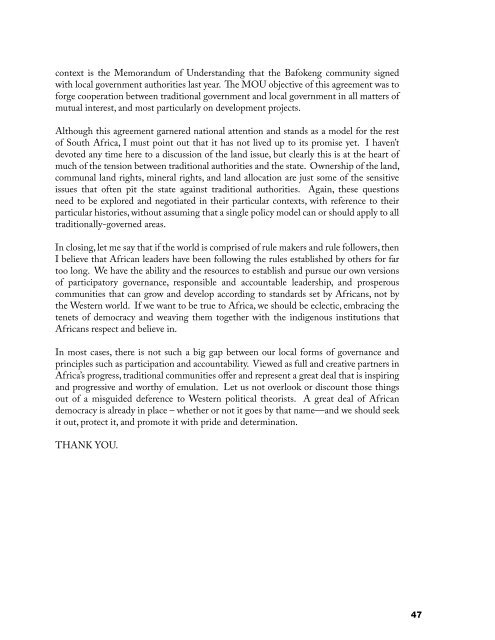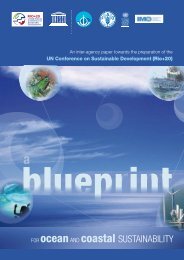Relevance of - United Nations Economic Commission for Africa
Relevance of - United Nations Economic Commission for Africa
Relevance of - United Nations Economic Commission for Africa
You also want an ePaper? Increase the reach of your titles
YUMPU automatically turns print PDFs into web optimized ePapers that Google loves.
context is the Memorandum <strong>of</strong> Understanding that the Bafokeng community signed<br />
with local government authorities last year. The MOU objective <strong>of</strong> this agreement was to<br />
<strong>for</strong>ge cooperation between traditional government and local government in all matters <strong>of</strong><br />
mutual interest, and most particularly on development projects.<br />
Although this agreement garnered national attention and stands as a model <strong>for</strong> the rest<br />
<strong>of</strong> South <strong>Africa</strong>, I must point out that it has not lived up to its promise yet. I haven’t<br />
devoted any time here to a discussion <strong>of</strong> the land issue, but clearly this is at the heart <strong>of</strong><br />
much <strong>of</strong> the tension between traditional authorities and the state. Ownership <strong>of</strong> the land,<br />
communal land rights, mineral rights, and land allocation are just some <strong>of</strong> the sensitive<br />
issues that <strong>of</strong>ten pit the state against traditional authorities. Again, these questions<br />
need to be explored and negotiated in their particular contexts, with reference to their<br />
particular histories, without assuming that a single policy model can or should apply to all<br />
traditionally-governed areas.<br />
In closing, let me say that if the world is comprised <strong>of</strong> rule makers and rule followers, then<br />
I believe that <strong>Africa</strong>n leaders have been following the rules established by others <strong>for</strong> far<br />
too long. We have the ability and the resources to establish and pursue our own versions<br />
<strong>of</strong> participatory governance, responsible and accountable leadership, and prosperous<br />
communities that can grow and develop according to standards set by <strong>Africa</strong>ns, not by<br />
the Western world. If we want to be true to <strong>Africa</strong>, we should be eclectic, embracing the<br />
tenets <strong>of</strong> democracy and weaving them together with the indigenous institutions that<br />
<strong>Africa</strong>ns respect and believe in.<br />
In most cases, there is not such a big gap between our local <strong>for</strong>ms <strong>of</strong> governance and<br />
principles such as participation and accountability. Viewed as full and creative partners in<br />
<strong>Africa</strong>’s progress, traditional communities <strong>of</strong>fer and represent a great deal that is inspiring<br />
and progressive and worthy <strong>of</strong> emulation. Let us not overlook or discount those things<br />
out <strong>of</strong> a misguided deference to Western political theorists. A great deal <strong>of</strong> <strong>Africa</strong>n<br />
democracy is already in place – whether or not it goes by that name—and we should seek<br />
it out, protect it, and promote it with pride and determination.<br />
THANK YOU.<br />
47
















